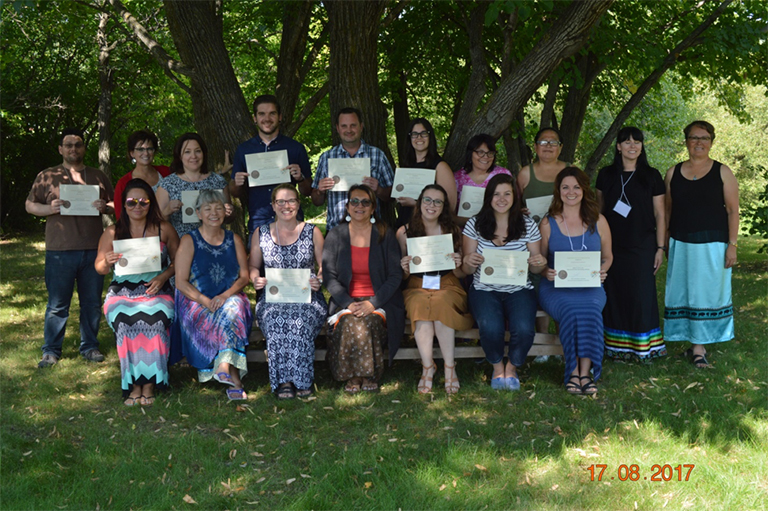
The Treaty Education Initiative’s K-12 teacher’s guides are framed on four big ideas: Relationships, Traditional Teachings, History, and Treaties.
By Connie Wyatt Anderson
— Posted October 12, 2017

The Treaty Education Initiative’s overarching goal is to bring Treaty education to all Manitoba students, from kindergarten to grade 12. The TEI’s K-12 teacher’s guides are framed on four big ideas: Relationships, Traditional Teachings, History, and Treaties. It was these curricular linchpins that provided the themes for the 2017 Treaty Education Summer Institute.
Held over three days, August 15-17, the TEI Summer Institute saw 14 Manitoba educators take part in interactive learning sessions held at different locales: Turtle Lodge, located in Sagkeeng First Nation; Upper Fort Garry in downtown Winnipeg; and Lower Fort Garry, north of Winnipeg at St. Andrews.
The theme of Day 1 was Traditional Teachings. Participants met at Turtle Lodge, opening the session with a traditional pipe ceremony in an adjacent sweat lodge led by founder, Elder Dave Courchene Jr. Elder Courchene - Nii Gaani Aki Inini (Leading Earth Man)—alongside other Elders and Traditional Knowledge Keepers, including Dr. Elder Harry Bone of Keeseekoowenin Ojibway Nation, spent the day modelling, exploring, and reinforcing the role and importance of spirit and intent as an integral part of the Treaty relationship.
Day 2 saw the Summer Institute team meet at the Treaty Relations Commission of Manitoba office on Hargrave Street for a lead-up session led by noted Western Canadian historian, Dr. Gerald Friesen. Focusing on the day’s theme – Relationships – Dr. Friesen, together with Friends of Upper Fort Garry executive director, Penny McMillan, provided context for the ensuing tour of the Upper Fort Garry gate by focusing on relationships between First Nations, Newcomers, and Métis before the signing of the Numbered Treaties. The group walked to the site of the Upper Fort and were led on a tour of the newly opened provincial heritage park.
The day was bookended by a series of mini-sessions centered on the teaching of Treaties in the classroom. Led by TEI Lead Facilitator and one of the principal writers for the TEI teacher resources, Connie Wyatt Anderson, participants explored the connection between teaching Treaties and Historical Thinking; partook in an interactive timeline activity based on the Treaty relationship before 1871; and considered the importance of teaching history with Indigenous perspectives.
The culminating day of the TEI Summer Institute was held at Lower Fort Garry, the site where Treaty #1 was signed in 1871. The day’s agenda was framed around the theme of Treaties and the session began with a pipe ceremony led by Roseau River Anishinaabe First Nation Elder Charlie Nelson. Newly appointed Treaty Commissioner Loretta Ross brought morning greetings and was followed by Dr. Jean Friesen, retired professor of History at the University of Manitoba who specializes in the history of Aboriginal-European relations; notably the history of Treaties 1 and 3. Complementing Dr. Friesen’s discussion on Treaty #1, was a presentation by Indigenous lawyer Aimée Craft. Author of Breathing Life Into the Stone Fort Treaty, Ms. Craft’s talk focused on understanding and interpreting Treaties from an Anishinaabe inaakonigewin legal perspective. Aimee is a bilingual speaker and is a member of the TRCM Speakers Bureau.
The second half of Day 3 saw TEI advisor, Cynthia Bird lead a session where teachers were given hands-on opportunities to practice customizing their lessons and curricula for their Treaty-specific territories, using her work and research on Peguis First Nation as a template. The Institute closed with a walking tour of Lower Fort Garry, a sharing circle, and presentation of certificates to participants.
The Treaty Education Initiative Summer Institute 2017 marked the fourth summer professional development session for the Treaty Relations Commission of Manitoba. The TEI began as a pilot project in 2010, and rolled out as a full K-12 learning initiative in 2014, and continues to grow. As of the 2017-2018 school year, over 2,000 Manitoba educators have participated in Treaty Education training and over 1,000 Treaty Education Kits have been distributed.